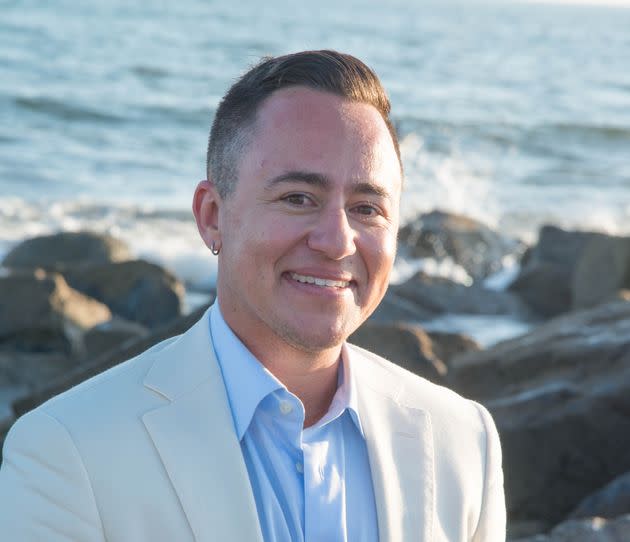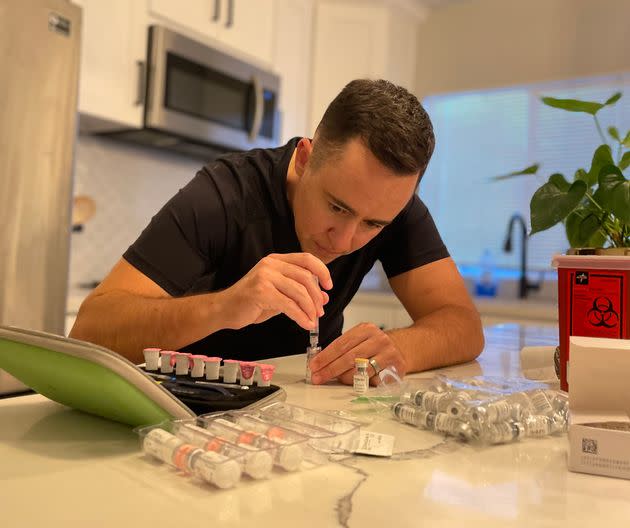I'm A Trans Man. Here's What I Risked For The Chance To Get My Wife Pregnant With My DNA.

"My gender was wrong, and I had to fix it no matter the costs," the author writes. (Photo: Courtesy of James Bennett)
“Your eggs will be scrambled,” the doctor told me dismissively as she handed me a pamphlet on egg freezing options. I was 25, terrified of what was next, yet eager to begin my transition from female to male. I was two months out from top surgery, a double mastectomy to remove my breasts, and had been painstakingly weighing this decision for years. My gender was wrong, and I had to fix it no matter the costs.
As the prospect of taking testosterone came closer to my reality, so did the sinking feeling that my contribution to a child in the future would be next to impossible. Taking hormones would surely destroy any ability to take part in this strict, biologically defined process. That day, sitting across from the disconnected doctor, my greatest fears were confirmed. Unless I chose to freeze my eggs prior to starting testosterone, all hope was lost. I would have to adopt or watch my future wife be inseminated with someone else’s genetic code. I could still be a dad, but never by blood. I was distraught at the notion, yet the alternative was far too distressing to consider.
I knew I would be unable to go through the grueling process of egg retrieval in the state I found myself in. I didn’t have the money, emotional energy, or wherewithal to make it much longer. I was barely hanging on as it was. Years of battling horrendous gender dysphoria had left me beaten down, and regardless of where I would be in the future, my eggs sitting frozen in a lab somewhere surely would not be part of the equation. I would worry about children at a later date. I had to take care of me or there may be no me at all.
As I plunged the first needle of testosterone into my thigh a month later, I said a saddened goodbye to the children I could never have. Shot after shot, I barely looked back. I watched as my body, mind, and place in society shifted, pushing thoughts of children further away. I still had yet to find somebody that would put up with me forever.
The years passed quickly as I grew into my early 30s. My new body took many years to adjust to, but I eventually found peace ― a sense of tranquility I had never imagined possible. I finally recognized the person I saw in the mirror and the remaining misalignment between my body and mind was minimal.
Alongside, I found my wife and an invitation into a future that felt beautiful beyond measure. We went back and forth on the concept of children for almost a year after we got married, and although there appeared to be many cons, the desire to “expand our unit” held true. Life is scary and hard, and surely having little versions of us would bring more joy than not. There was only one roadblock: they couldn’t be versions of us because there was no me to contribute.

The author and his wife, Lauren, on their wedding day, July 31, 2021, at Hotel Del Coronado, California. (Photo: Courtesy of James Bennett)
We sat in the kitchen one afternoon painstakingly reviewing our options. I didn’t regret my decision not to freeze my eggs, but I wished this picture looked different. It was just as hard as I had imagined it would be all those years ago.
My wife suddenly interrupted my thought spiral with one simple question, “James, are you sure you can’t contribute?” It hit me like a ton of bricks, leaving me speechless. “Have you ever actually looked into it?” she pressed on. I wasn’t sure how to respond, so I took the next obvious millennial step and began Googling.
Two months later, we were sitting across from a local physician who specialized in fertility for transgender couples. “Studies have shown that fertility outcomes for transgender men are in line with that of cisgender women,” she said. “We believe that elevated testosterone levels simply place the processes of ovulation and menstruation into hibernation.”
My wife and I squeezed hands under the table. Our online search had pointed to this same information, but the prospect didn’t feel possible unless it came out of the mouth of an actual health care professional. There was only one obvious caveat ― I would have to come off hormones to bring my necessary body parts out of hibernation.
After almost seven years of testosterone, the prospect of deliberately skipping my weekly shot was a terrifying one. I couldn’t fathom the thought of losing the stability I had worked so hard to obtain. The doctor suggested it would take about two months for my testosterone to drop to the desired levels, but even one day resembling my prior state felt like too many.
The fear attacked my brain, resulting in a chest tightness that I hadn’t felt in years.I knew that my deepened voice and hair patterns wouldn’t revert back, but there was no guarantee how the rest of my body would fare.
Without testosterone, my fat would surely redistribute back to my hips, and the associated dysphoria would trail shortly behind it. The testosterone didn’t make me a man ― I know that I am and always will be a man, even without hormones ― but without it, how my body looked and felt, and how I felt about it and in it would change. Was it really worth jeopardizing my well-being just to have a genetic link to my non-guaranteed future child?
After almost seven years of testosterone, the prospect of deliberately skipping my weekly shot was a terrifying one. I couldn’t fathom the thought of losing the stability I had worked so hard to obtain.
I decided that I would try, or regret the decision for the rest of my life. I could always call it quits if the process became too unbearable. To my surprise, the first few weeks off testosterone were rather uneventful. I felt a slight increase in fatigue, some soreness in my chest, and a welcomed clearing of testosterone-driven acne along my jawline. In unison, my teenage boy appetite completely diminished, and I lost five pounds seemingly overnight.
My demeanor was calmer, and I strangely regained my ability to multitask, something I had lost when I started testosterone all those years ago. My wife made the observation that I appeared somewhat subdued and “not my normal self,” but the shift wasn’t remarkable enough to ever consider halting the baby-driven science experiment.
Two weeks shy of the doctor’s estimation, my testosterone levels had fallen shockingly into the range of a typical cisgender woman. Distant feelings of dysphoria had started to resurface, but the daunting task of actually starting the “reciprocal IVF” cycle consumed any emotional capacity I had available.
The plan was to retrieve my eggs, fertilize them with donor sperm and end up with at least three healthy embryos. The doctor would then implant an embryo into my wife, and we would hopefully have ourselves a baby. Our child would be us with a little help: my egg, “Marco” (our nickname for the donor sperm), and my wife’s body to grow the beautiful being. We planned to use the same donor with my wife’s egg for baby number two.
As many cisgender women know, the IVF cycle is not a fun one. I struggled through two grueling weeks of self-administered injections into my stomach, almost daily ultrasounds and bloodwork, and an increasing sense of bloating that got worse by the day. Not to mention the discomfort of being the only male-identified patient in an all-female fertility clinic.
On the day of the “trigger,” the anxiety of the upcoming egg retrieval became almost impossible to manage. What if they go in and there are no eggs? What if I’ve gone through all of this for nothing? I wouldn’t know until I woke up from the procedure.
As I drifted off into anesthesia bliss, I hoped for the best. This had all gone so well, a stark contrast to what I’d been told from the start. Testosterone was supposed to “ruin” my body, but that hadn’t yet proven true. I felt optimistic that things might continue in the same vein. I woke up 45 minutes later to my wife’s smiling face and three exclamatory words, proof that my inkling had been correct: “They got 10!”
A feeling of joy took over my tired body. We had gone from “scrambled” to “10.” Tears of relief streamed down our cheeks.

The author preparing one of two nightly injections required during the second week of the IVF cycle. (Photo: Courtesy of James Bennett)
The next week was more anxiety-provoking than those prior. My body crashed intensely from the hormone high, leaving me unbalanced and physically unwell, and every two days was accompanied by a call from the embryologist for an update. It initially seemed like a farfetched science experiment, but with each piece of good news, the difficulty began to feel manageable. Our 10 eggs turned into eight fertilized embryos, six of which ended up in the “viable” category. Two good, one fair, and three on the border of fair and poor. My wife and I screamed and embraced at the conclusion of each call. We were one step closer to building our unit.
Following the freezing of our embryos, we mutually agreed to take a much-needed break. We would pursue my wife’s portion of the cycle at a later date, and for now, focus on getting me back to my happy, mostly non-dysphoric self.
I chose to wait at least a week and a half until I started testosterone again on account of the information from the doctor. It would take about two weeks to rid my body of the excess female hormones I had consumed, and I had no desire to counter that with an influx of testosterone. My body was only just starting to feel better.
Unexpectedly, over that second week, the absence of physical discomfort left my brain free to focus on other things. The months without testosterone had finally started to take their toll, and considering I was no longer hiding away in the house with IVF medications, I suddenly found myself consumed with worry that I was no longer passing as male. I spent far too much time overanalyzing my “curves” in the mirror despite my body barely changing at all. When leaving a public restroom one day, I clocked a man double-checking the gender sign as he saw me exiting and I almost imploded with panic. It didn’t matter that it was probably just his reflex.
A day or so later, when a waiter referred to me and my girlfriends as “ladies,” I almost had to leave dinner on account of the distress. He clearly hadn’t seen me, but my brain cruelly picked up where it had left off all those years ago. My mental state continued to deteriorate, leaving me depressed and desperate to escape, regardless of the fact that no one ever actually misgendered me this time around. I hadn’t thought about suicide in years, and I worried I wouldn’t make it out a second time.
I was meant to be male, and skimming along the surface of my prior self had concretely affirmed that.
As I finally reached the middle of week three, a sense of immense relief overtook me as I watched the needle of testosterone sink deep into my thigh. Get me out of here, my brain screamed as the liquid exited the syringe. I hurriedly said goodbye to the parts of me that I had enjoyed revisiting; the clearer skin, temporary halting of my receding hairline and slightly slimmer waistline. I was meant to be male, and skimming along the surface of my prior self had concretely affirmed that.
After a day back on hormones, I was already well on my way to feeling like myself again. The dysphoria quickly dissipated, and my wife and I launched full force into planning our last hurrah of the summer. We set up a whirlwind of trips, eating and enjoying one another before her part comes to life — hopefully, literally.
We aren’t sure how the embryos will do, but we will forever revel in the fact that the impossible became possible. My eggs weren’t scrambled, and I can be a dad by blood after all. As an added bonus, my refreshed appreciation for testosterone will never be forgotten.
James Bennett is a 32-year-old trans man from Australia, currently living in San Diego, California. He works in the medical device industry and is happily married with no kids (yet) and a grumpy, 10-year-old corgi named Bailee. He loves cycling, traveling and writing. James’ memoir, “SPILLING THE T,” will be available in 2023.
Do you have a compelling personal story you’d like to see published on HuffPost? Find out what we’re looking for here and send us a pitch.
This article originally appeared on HuffPost and has been updated.

